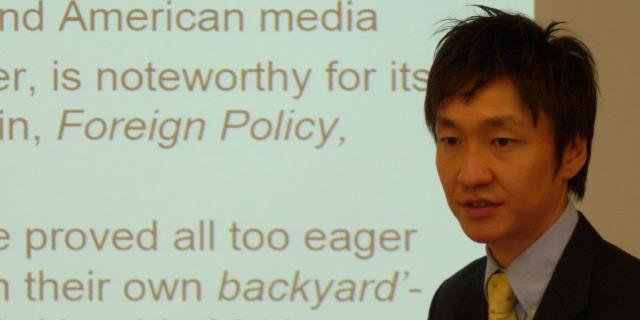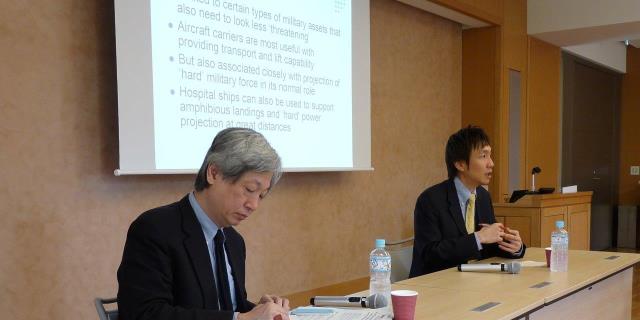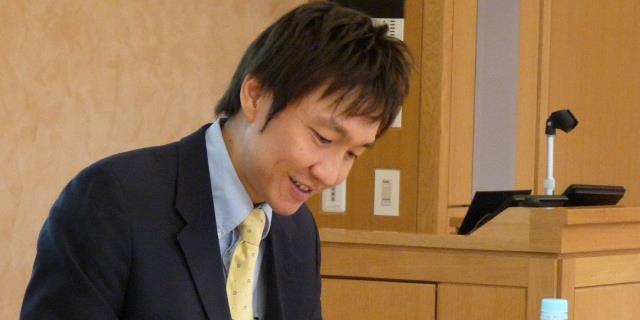SSU Forum with Professor Yee Kuang HENG
| Date: | Tuesday, April 22, 2014, 10:30-12:00 |
|---|---|
| Venue: | Seminar Room, 3rd Floor, Ito International Research Center |
| Subject: | ‘Soft’ power dimensions of Japan's re-balancing towards South-east Asia |
| Lecture: | Professor Yee Kuang HENG from the National University of Singapore (NUS) |
| Language: | English |
| Hosted by: | Security Studies Unit, Policy Alternatives Research Institute, the University of Tokyo |

The SSU was honoured by the visit of Professor Yee Kuang Heng from the Lee Kuan Yew School of Public Policy, The National University of Singapore.
SSU Director Professor Kiichi Fujiwara introduced the guest to the audience as one of the most trustworthy voices in the current landscape of South East Asia security studies, while recalling his main current research focus on the concept of “soft power” and its application in this region of the world, hence the title of Professor Heng's presentation, namely The “Soft” Power Dimensions of Japan's Re-Balancing Towards South-East Asia.

Professor Heng introduced his talk by recalling the recent, and possibly overdue, large-scale Japanese initiative in establishing closer contacts with Southeast Asian nations, first in terms of economic ties, and, more prominently from a security studies perspective, in terms of diplomatic and defence initiatives.
On the economic front, Professor Heng has pointed at the record number of mergers and acquisitions operated by Japanese companies in the ASEAN region in 2013, and the surge in FDIs. But more visible has been Prime Minister Abe's diplomatic presence in the area, as he has been the first Japanese PM to visit all ten ASEAN members within the first year in office. What is the rationale behind this renewed Japanese interest for Southeast Asia? Some economic factors appear to be clearly related to the decision by Japanese businessmen to diversify part of their international assets away from China, not only in order to hedge against political risks, but also because of the growing costs of operating in the PRC, particularly when many ASEAN nations have now considerably lower labour costs. But political factors seems to be more important at this juncture.
In particular, Professor Heng makes the argument of Japan's continuous effort for the promotion of its own image of a regional power upholding international norms and “legitimate, desirable and normal behaviour”, especially in the areas of maritime security and over-flight in international airspace, in contrast to a more aggressive and less predictable Chinese stance. Professor Heng has provided a very detailed review of the numerous Japanese initiatives going in this direction, including those involving the use of JSDF forces for international cooperation in training and capacity building, as well as rescue operations.
While this soft power effort has certainly yielded positive outcomes for Japanese diplomacy, it also entails quite visible limits. Indeed, many ASEAN nations are trying to pursue the goal of equidistance from all great powers, and are reluctant to participate in initiatives which may be read as directed against third parties, particularly against China. Ideally in fact ASEAN countries wish to prolong the current status quo as far as possible, thus resisting further polarisation.
On the other hand, Japan's initiatives have not escaped Beijing's attention, which has been critical of them. But there are also other, possibly more fundamental problems in promoting the image of a norm-abiding power, when the norms in questions (e.g. the UNCLOS articles pertaining the EEZ) are subjected to contested interpretation coming not only from China, but from India, Brazil and other states.

Finally, Professor Heng has also highlighted the problem of the possible ambiguity in operating soft power initiatives with military assets, which have a rather obvious dual use for both rescue and relief operations as well as for proper defence. It is a fine line for Japan when it comes to the use of such assets in order to promote a certain positive image, while not being too exposed to the risk of appearing aggressive and interventionist, thus strengthening the entrenched stereotype currently still attached to Japanese foreign and security policy.
-
Assistant Dean (Research) & Associate Professor, Lee Kuan Yew School of Public Policy, National University of Singapore.
